Khan Lee (李崗) is interested in history, but not the kind in textbooks. He wants to know what Taiwan looked like before the Japanese and the Chinese Nationalist Party (KMT) came, and how people ran businesses, went to school or trained an army. In 2008, the film director and producer came across a descendant of Wufeng’s (霧峰) Lin (林) family — one of Taiwan’s five great historic clans — and believed he had found everything he ever wanted to know.
“The family has experienced and survived a tumultuous chapter in modern history. Through it, we can see the changing relations between Taiwan and the rest of the world,” he says.
Five years and more than NT$30 million later, Khan Lee and a top-notch team including five historians released Attabu (阿罩霧風雲). The documentary film, which hit the mainstream market earlier this month, follows the fascinating history of the Lin family, starting from the Qing Dynasty when its founding ancestors migrated to Taiwan. The clan subsequently took root and thrived in Greater Taichung’s Wufeng, called Attabu in the language of Lowland Plains Indigenous Peoples (also known as the Pingpu Aborigines, 平埔族), who inhabited the region before they were killed, displaced or assimilated into Han Chinese society.
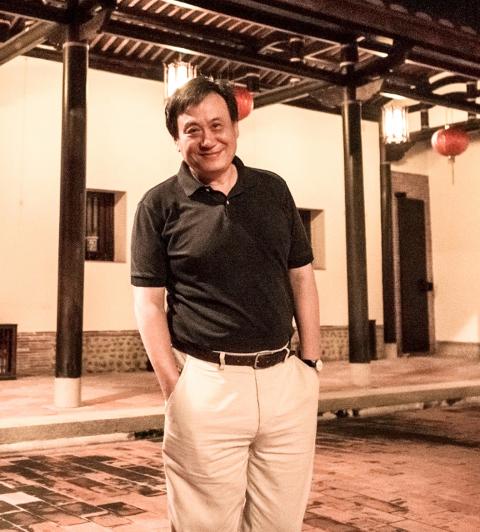
Photo Courtesy of Encore Film
Seeking history
It’s not surprising that the tale of the Lin clan — an immigrant family — strikes a chord with Khan Lee.
He belongs to the so-called Mainlander Second Generation (外省第二代): His father moved to Taiwan with the KMT troops from China after World War II.
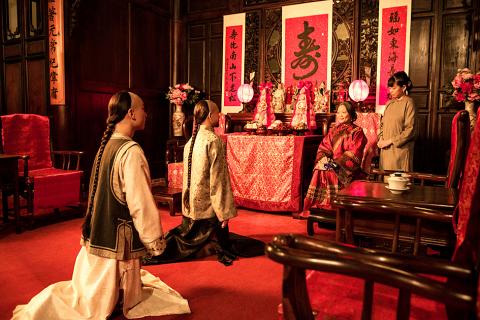
Photo Courtesy of Encore Film
“But I am not going to spend five years making a film about the Lee family in China. I was born and grew up in Taiwan. I want to love Taiwan, but I suffer from amnesia. I don’t remember my history, my home. I need to know exactly what I love,” Khan Lee, the film’s producer, told the Taipei Times.
So Khan Lee studied the Lins.
He compares the clan with the Corleone family in Francis Ford Coppola’s Godfather trilogy, in which the first-generation settlers “needed to kill and fight over resources in order to make a place for themselves in a hostile, foreign land.”
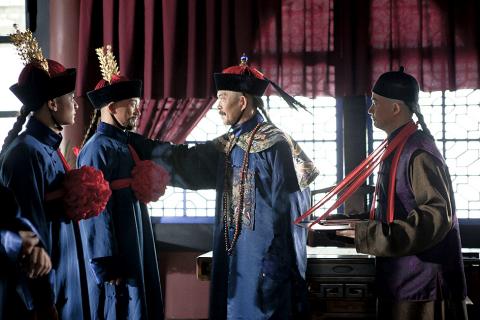
Photo Courtesy of Encore Film
The Lins, however, took their fight for survival to a professional level.
Noted for their military prowess, the militia family was recruited to help suppress the Taiping Rebellion (1850-1864) against the ruling Qing Dynasty.
During the Sino-French War, the Lins were recruited again to Keelung, where they successfully stopped an invasion by the French army. In return, they were awarded titles by the imperial court and tremendous wealth in the form of a camphor monopoly, until the cession of Taiwan to Japan in 1895.
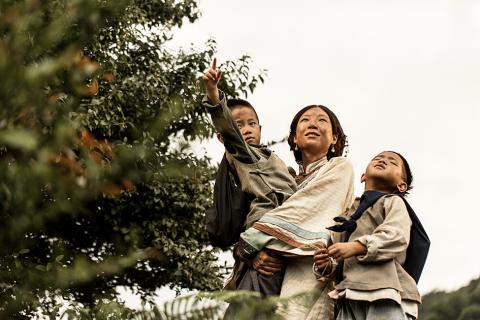
Photo Courtesy of Encore Film
To Khan Lee, Wufeng’s Lin family is the epitome of Taiwan, which is forever caught in between the world’s great powers.
“The family always has to make choices — choices to side with the central government or regional forces, to become Japanese or Chinese, to side with Chinese nationalism or communism,” he notes.
Filling the void
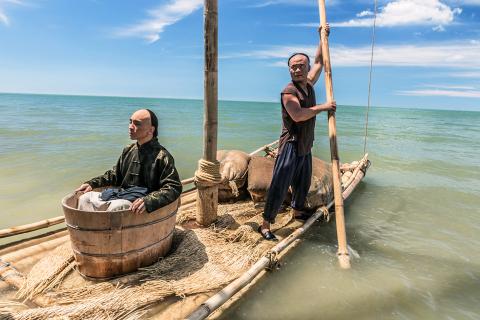
Photo Courtesy of Encore Film
Khan Lee expects the film to face intense scrutiny, not just by clan descendants but also by people in academic and political circles. That’s because Attabu deals with a controversial chapter of Taiwanese history that is often distorted — or altogether ignored — to serve different political interests, he says.
“The KMT doesn’t mention the family because its members were killed during the White Terror era, while the DPP has no interest in the part of Taiwanese history when men wore queues,” he adds. “Meanwhile, the Chinese Communist party makes television drama in which the inhabitants of Taiwan speak with a perfect Beijing accent and love their fatherland.”
In Attabu, Khan Lee tries to depict the era faithfully. Using historically accurate props and costumes, Khan Lee and his team are able to craft meticulous reconstructions of bygone events, allowing viewers to “actually see what Taiwan looked like and then fill in the blanks.”
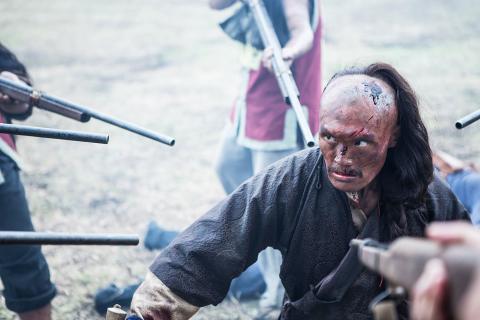
Photo Courtesy of Encore Film
Early in this process, Khan Lee was saddened to find that Taiwan’s film industry — after two decades of decline — had largely lost the knowledge, skills and talent required to make a convincing historical film. Khan Lee turned to veteran art director Lee Pao-lin (李寶琳), who has mostly worked in China and whose portfolio includes Lust, Caution (色,戒) by Khan Lee’s older brother, Ang Lee (李安). Lee Pao-lin helped decide how the buildings, people and the surroundings should look in the Taiwan of over a century ago. Every prop was made by a team in Beijing and shipped back to the Taiwanese crew as a loan.
“It is truly tragic when a place can’t even tell its own story,” Khan Lee laments. “Wei Te-sheng (魏德聖) certainly wouldn’t have had to spend NT$700 million to make Seediq Bale if we still had the knowledge and skills.”
With the release of Attabu, Khan Lee wishes to attract enough funding to complete the second part of the project, which tells the story of the Lins under Japanese rule and after the arrival of the KMT.
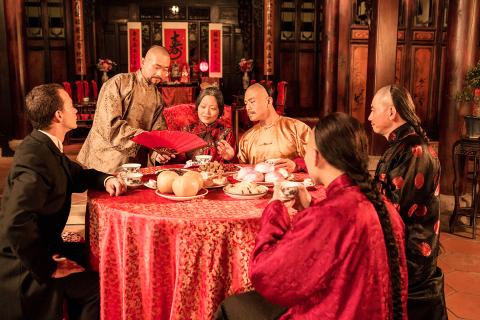
Photo Courtesy of Encore Film
“I was 51 years old when I first started the project. Now I am 56,” Khan Lee says, “I feel an anxious need to speed up and tell our own stories. Otherwise, they may be lost forever or told by others who will interpret our history differently.”

Google unveiled an artificial intelligence tool Wednesday that its scientists said would help unravel the mysteries of the human genome — and could one day lead to new treatments for diseases. The deep learning model AlphaGenome was hailed by outside researchers as a “breakthrough” that would let scientists study and even simulate the roots of difficult-to-treat genetic diseases. While the first complete map of the human genome in 2003 “gave us the book of life, reading it remained a challenge,” Pushmeet Kohli, vice president of research at Google DeepMind, told journalists. “We have the text,” he said, which is a sequence of

On a harsh winter afternoon last month, 2,000 protesters marched and chanted slogans such as “CCP out” and “Korea for Koreans” in Seoul’s popular Gangnam District. Participants — mostly students — wore caps printed with the Chinese characters for “exterminate communism” (滅共) and held banners reading “Heaven will destroy the Chinese Communist Party” (天滅中共). During the march, Park Jun-young, the leader of the protest organizer “Free University,” a conservative youth movement, who was on a hunger strike, collapsed after delivering a speech in sub-zero temperatures and was later hospitalized. Several protesters shaved their heads at the end of the demonstration. A

Every now and then, even hardcore hikers like to sleep in, leave the heavy gear at home and just enjoy a relaxed half-day stroll in the mountains: no cold, no steep uphills, no pressure to walk a certain distance in a day. In the winter, the mild climate and lower elevations of the forests in Taiwan’s far south offer a number of easy escapes like this. A prime example is the river above Mudan Reservoir (牡丹水庫): with shallow water, gentle current, abundant wildlife and a complete lack of tourists, this walk is accessible to nearly everyone but still feels quite remote.

In August of 1949 American journalist Darrell Berrigan toured occupied Formosa and on Aug. 13 published “Should We Grab Formosa?” in the Saturday Evening Post. Berrigan, cataloguing the numerous horrors of corruption and looting the occupying Republic of China (ROC) was inflicting on the locals, advocated outright annexation of Taiwan by the US. He contended the islanders would welcome that. Berrigan also observed that the islanders were planning another revolt, and wrote of their “island nationalism.” The US position on Taiwan was well known there, and islanders, he said, had told him of US official statements that Taiwan had not